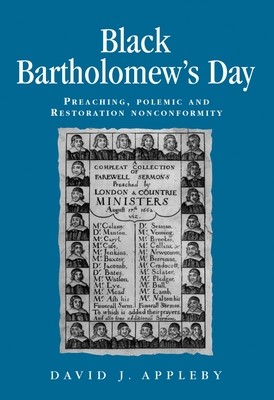
- We will send in 10–14 business days.
- Author: David Appleby
- Publisher: Manchester University Press
- ISBN-10: 0719087805
- ISBN-13: 9780719087806
- Format: 15.6 x 23.4 x 1.5 cm, softcover
- Language: English
- SAVE -10% with code: EXTRA
Reviews
Description
Black Bartholomew's Day explores the religious, political and cultural implications of a collision of highly-charged polemic prompted by the mass ejection of Puritan ministers from the Church of England in 1662.David Appleby's book, the first in-depth study of this heated exchange, centres on the departing ministers' farewell sermons. Many of these valedictions, delivered by hundreds of dissenting preachers in the weeks before Bartholomew's Day, would be illegally printed and widely distributed, provoking a furious response from government officials, magistrates and bishops. Black Bartholomew's Day re-interprets the political significance and ostensibly moderate and marginalised Puritan clergy posed a credible threat to the restored political order.
This book approaches the texts, their authors and audiences from a number of angles: investigating the preachers' need to reconcile political loyalty with religious integrity; considering nonconformist and conformist sermons in terms of performance and rhetorical content and revealing how political comment could be surreptitiously broadcast. Appleby demonstrates how the nonconformist message was affected by the process of scribal and printed circulation, discussing authorship, reception, marketing and censorship. In exploring the polemical responses to the farewell sermons, he argues that individuals within the Restoration establishment exploited the texts to pursue an anti-Puritan agenda which served to further their personal careers. Finally, an epilogue charts how the farewell sermons have been regularly repackaged over subsequent centuries.This book is aimed at readers interested in historicism, religion, nonconformity, print culture and the political potential of preaching in
Restoration England.
EXTRA 10 % discount with code: EXTRA
The promotion ends in 11d.17:22:45
The discount code is valid when purchasing from 10 €. Discounts do not stack.
- Author: David Appleby
- Publisher: Manchester University Press
- ISBN-10: 0719087805
- ISBN-13: 9780719087806
- Format: 15.6 x 23.4 x 1.5 cm, softcover
- Language: English English
Black Bartholomew's Day explores the religious, political and cultural implications of a collision of highly-charged polemic prompted by the mass ejection of Puritan ministers from the Church of England in 1662.David Appleby's book, the first in-depth study of this heated exchange, centres on the departing ministers' farewell sermons. Many of these valedictions, delivered by hundreds of dissenting preachers in the weeks before Bartholomew's Day, would be illegally printed and widely distributed, provoking a furious response from government officials, magistrates and bishops. Black Bartholomew's Day re-interprets the political significance and ostensibly moderate and marginalised Puritan clergy posed a credible threat to the restored political order.
This book approaches the texts, their authors and audiences from a number of angles: investigating the preachers' need to reconcile political loyalty with religious integrity; considering nonconformist and conformist sermons in terms of performance and rhetorical content and revealing how political comment could be surreptitiously broadcast. Appleby demonstrates how the nonconformist message was affected by the process of scribal and printed circulation, discussing authorship, reception, marketing and censorship. In exploring the polemical responses to the farewell sermons, he argues that individuals within the Restoration establishment exploited the texts to pursue an anti-Puritan agenda which served to further their personal careers. Finally, an epilogue charts how the farewell sermons have been regularly repackaged over subsequent centuries.This book is aimed at readers interested in historicism, religion, nonconformity, print culture and the political potential of preaching in
Restoration England.


Reviews